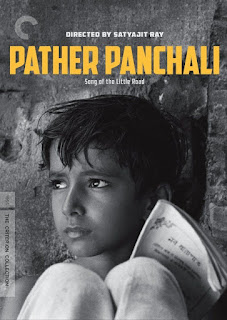
Along with displaying the reality of the relatable drama of life, director Satyajit Ray takes the time to explore and follow the digressions of life that always surround us, even amidst turmoil. Siblings argue constantly but just as easily reconcile and play. Neighbors and friends stop by and help but also add obstacles and make demands. The camera is especially descriptive as it focuses on small details, both mundane and divine. He's not afraid to sit and watch insects on the surface of the water or a pond of water lilies. Whether in the home or out in the jungle as children play, it's all very natural. The eye for beautiful frames is a great example of raw talent combined with beginner's luck and a clear purpose overcoming a complete lack of experience on the part of almost all the cast and crew. Although he's not as central to the drama, the bright-eyed boy Apu reminds us that children aren't fully aware of the extenuating circumstances that make up their lives and are always just themselves, finding it as easy to complain as to forgive.

It often happens that when you experience something personally groundbreaking that's contemporary to you, you imagine it's ideas are novel and innovative. Then, as you go through life you realize an earlier work did it first and better and your respect for that initial artifact diminishes in accomplishment, if not in its personal impact: "There is nothing new under the sun." An example of this is the Charlie Kaufman-written film Adaptation, directed by Spike Jonze. The movie is the story of itself. It follows its own screenwriter attempting to adapt a nonfiction memoir on orchid thieves for the big screen. As you watch you feel it is being written and produced before your eyes. Years later, in making my way through come of the cinema greats I would come to watch Fellini's masterpiece 8 1/2, a story of an acclaimed director attempting to come up with and produce his next feature only to end up creating a movie about the process itself. I learned Fellini did it first and best. This is all a meandering way to say that Ray's debut film Pather Panchali is the spiritual ancestor to Richard Linklater's longsuffering 2012 film Boyhood. Although I love that film, as with Fellini, Ray did it first and best.
This film, while not purposefully ambitious to the degree that Linklater's 12 year-long production was, it's struggles to get financing coming in starts and stops meant filming took place over three years. This meant big risks in relying on key cast members to be continually available, especially those so young and old as some of the key players here. More importantly than the logistics, though, Pather Panchali is similar in how sits in the life of a family. I laughed as the wife mentions home repairs that keep getting pushed back while the husband requests she look at life more positively even as he ignores the problems he's avoiding. The results of his procrastination have some devastating effects. But many of these scenes ring quite true to some that have played out in my own home. Undoubtedly some aspect of this movie will do the same for you.


No comments:
Post a Comment